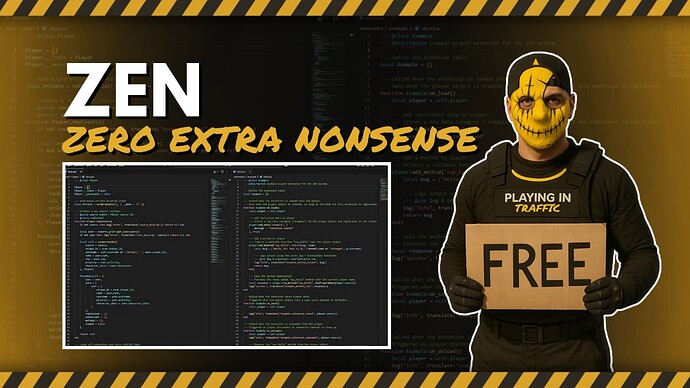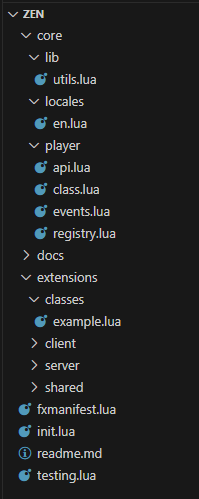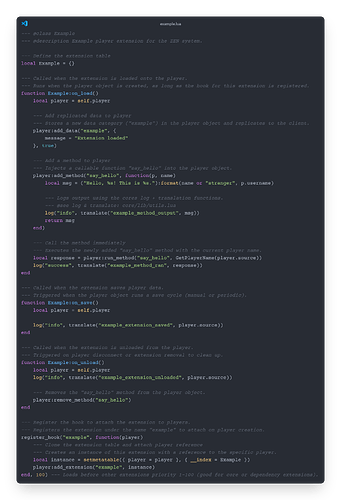



Price
UnknownA script by PlayingInTraffic




Price
UnknownZEN is intentionally minimal.
If you want a full city out of the box, this isn’t it.
If you want a stable foundation to build your own, welcome aboard.
ZEN is a minimal, modular server core built to give each player a clean, isolated Lua object.
No extra bloat, no forced features, just a solid foundation you fully control.
Perfect if you want full control and a lightweight, memory-safe core.
ZEN is a minimal server core.
It’s not a roleplay kit, it’s not a city template, and it’s not a collection of thrown together bloat.
It’s a core built around one principle: Only build what you need.
Just a clean, memory-safe core that gives every player their own scoped Lua object, created on join, destroyed on leave, and isolated the entire time.
You get full control.
You write the extensions.
You decide what loads.
You don’t fight the core.
ZEN lets you start clean and stay clean.
Because sometimes you just want to build what you need and nothing else.
Every other core ships with someone else’s idea of what a server should be.
ZEN was built to fix that.
If you want a full RP city, you can build it.
If you want a lightweight minigame server with just names and ranks, you can build that too.
The only limit here is you.
Every player gets their own Player object, created with Player.new(source).
It exists for the entire sessions and handles:
load, save, and unload eventsNo shared buckets. No mystery data. Just a clean object per player.
Internal state is stored using:
Private = setmetatable({}, { __mode = "k" })
Which means:
No ghosts. No leaks. No surprises.
Extensions are fully optional components that hook into each player.
They can:
on_load, on_save, on_unload)Extensions don’t talk to each other.
They don’t break each other.
And they don’t require some central config file from 2019.
Load one. Load five. Or load nothing. It still works.
| Function | Description |
|---|---|
Player.new(source) |
Creates a new player object for a source |
:load() |
Triggers all extension on_load hooks and syncs data |
:save() |
Triggers all on_save hooks and fires save event |
:unload() |
Triggers all on_unload hooks and cleans up memory |
:has_loaded() |
Returns whether the player has completed :load() |
| Function | Description |
|---|---|
:add_data(key, value, replicate) |
Adds new data under a category (optionally replicated) |
:get_data(key) |
Gets a specific category or all data |
:set_data(key, updates, sync) |
Updates an existing data table and optionally syncs |
:remove_data(key) |
Deletes a category and syncs its removal |
:has_data(key) |
Checks if the category exists |
:sync_data(key?) |
Sends replicated data to the client |
:update_user_data(tbl) |
Updates persistent graft user data safely |
| Function | Description |
|---|---|
:add_extension(name, ext) |
Attaches a new extension instance to the player |
:get_extension(name) |
Returns an attached extension |
:has_extension(name) |
Checks if an extension is present |
:list_extensions() |
Returns a list of loaded extension names |
Lifecycle hooks that extensions can define:
on_load(self)on_save(self)on_unload(self)All are triggered automatically via lifecycle events.
| Function | Description |
|---|---|
:add_method(name, fn) |
Adds a named method callable on this player object |
:remove_method(name) |
Removes a method by name |
:run_method(name, ...) |
Runs a method if it exists, passing the player as first arg |
:has_method(name) |
Returns whether a method exists |
:get_method(name) |
Returns the function reference if defined |
Extensions use this to inject flexible logic without needing to touch the core files.
| Function | Description |
|---|---|
:dump_data() |
Logs the player’s full public dataset |
Player.new(source)), not a shared tableZEN is a clean, class-based server core.
It doesn’t decide what your server is, it just gives you a secure, scalable foundation to build on.
You control what gets added.
You control what gets saved.
You control what gets synced.
ZEN just handles the structure.
You handle the systems.
Nothing really to screenshot? It’s just a core so have some code shots?
Folder Structure
Example Module
Need help or found a bug?
Join the PIT Discord and shout your issues: https://discord.gg/MUckUyS5Kq
Support Hours: Mon–Fri, 10AM–10PM GMT
Bring your config file. And a shovel.
See what others are saying about this script.
Share your experience and help others.